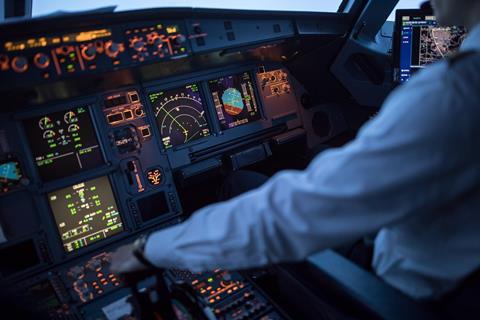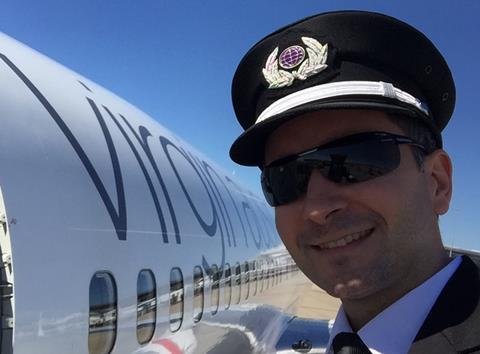Andres Czajkowski, a former first officer for Virgin Australia, gives an unflinching account of his feelings after being made redundant due to the coronavirus downturn.
I’m sat in a room full of people from different walks of life, all about to start a CPR and First Aid course. I figure it’ll add something to the CV other flying airplanes for the last 12 years.
The facilitator starts moving around the room asking to describe what we do and why are we here. I start feeling some mild to moderate dread, getting uncomfortable and shifting in my chair as the facilitator gets closer. I decide to throw caution to the wind and tell it like it is: “My name’s Andy,” I say. “I’m here to add a skill to my CV and, in my former life, I was an airline pilot for Virgin Australia.”

As I say those words, there’s a big sigh and the room becomes very quiet for what feels like 10 minutes. I know the whole room is thinking “poor guy!” Just six months ago, it would have been “what a cool job!”.
Pre-Covid, most of us could relate to the old joke about pilots: ‘How can you tell if there’s a pilot in the room? They’ll tell you.’ Nowadays, not so much.
Personally, I didn’t think that my identity was so tightly defined by my profession; turns out I was wrong.
For me, the phrase “I’m a pilot” says so much more than simply describing what I did to earn a living; it expresses pride, professionalism, a strong work ethic, ambition and passion. It summed me up as a person.
To have that job, which I loved, suddenly removed – in the space of a week – left me shaken and unsure.
Whether we recognise it or not, after any traumatic event in life, people usually go through what psychologists call the five stages of grief. Although I didn’t realise it at the time, after I lost my job I experienced them first hand. They didn’t follow any linear pattern but mostly intertwined and overlapped.
Denial: In my case, I would tell myself that this couldn’t be happening and that it was a dream from which I would soon wake up from.
Anger: There was no physical expression – the cupboard doors in my house remain un-punched – but I felt a deep hurt within my soul. Unless you’ve lived it, it is difficult to explain, but I would get angry at the world, at Covid, at the airline’s chief executive and even my wife for not understanding the gravity of the situation. This, of course, is a victim mentality and doesn’t help anyone.
Bargaining: The phrase “if only” is an attempt to bargain. To wish: if only I had applied for that job two months earlier, if only I hadn’t accepted this job three years ago…

Depression: This is an elephant in the room for most people, let alone pilots.
We don’t like showing weakness; it’s seen as taboo. But if we don’t talk about it now, then when will we?
I started feeling quite down at one point and couldn’t shake the sadness. Even if I did, it would be temporary, I couldn’t talk myself into a positive state of mind.
In the end I made the decision to see a counsellor. I had no idea what to expect – I never thought I’d need one before, but I was going down a dark path and needed to do something about it now, not later.
To be honest, it was the most liberating experience I’ve had in a long time, it was like the weight of the world came off my shoulders. The main point that the counsellor drove home - the main burden I was carrying - was that it wasn’t my fault; there was no decision I could have taken that could have spared myself and my family from this black swan event.
Acceptance: this is the final stage in the grieving process and the most challenging. I still struggle with this one, at times reverting to bargaining or denial. It is the hardest part of the journey because you have to accept complete responsibility for your life and move forward.
My Christian faith has certainly helped, but I am still a work in progress. Ultimately I need to ask the question: what would I do if I could never fly again?
You could argue that it is a pessimistic question, but I think it’s just realistic. Besides, it is necessary. I need to work out what else I could do – ideally something I am as passionate about as flying an airplane.
Whatever that looks like, and it will be different for all of us, we either move forward or stagnate. What happens to water when it doesn’t flow? It stagnates, it dies. So we must adapt and overcome, there is no other way.
While we don’t know where this pandemic will lead us, we can definitely choose our response to it; we can decide to stay still or accept responsibility for where we are and do something about it.
I don’t pretend this is easy - it is ridiculously hard, in fact - but this will eventually pass and many of us will return to the sky.
Others will have started successful businesses, moved into more rewarding careers, many, with more time at home, will have restored marriages and mended broken relationships. There is a silver lining to every situation.
Remember that we now have a choice to make: stagnate or move forward. We can adapt and overcome.
If you are a commercial pilot and would like to write for FlightGlobal then we would love to hear from you. Just send us a brief outline of what you’d like to cover and we will get back in touch. We are happy to use your contributions anonymously where necessary. Email: dominic.perry@flightglobal.com






















